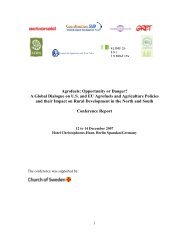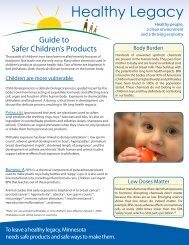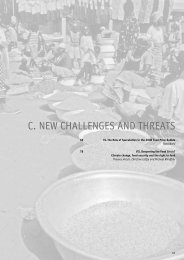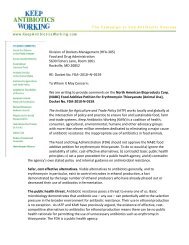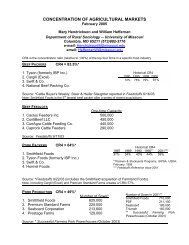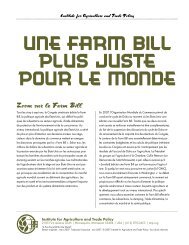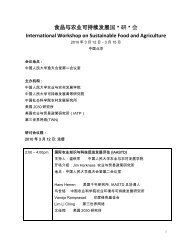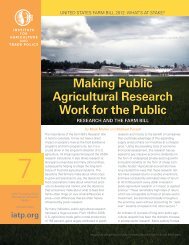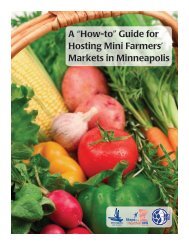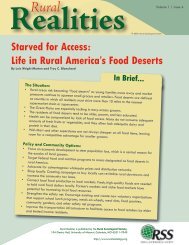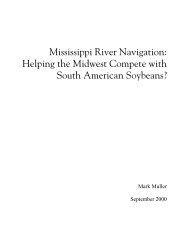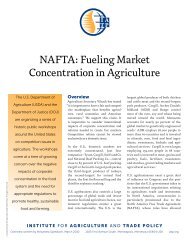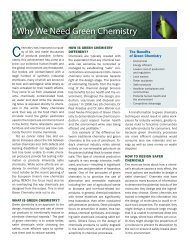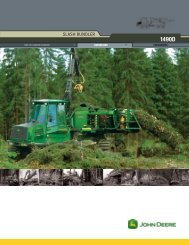IATP Hog Report - Institute for Agriculture and Trade Policy
IATP Hog Report - Institute for Agriculture and Trade Policy
IATP Hog Report - Institute for Agriculture and Trade Policy
Create successful ePaper yourself
Turn your PDF publications into a flip-book with our unique Google optimized e-Paper software.
Section 6<br />
with respect <strong>and</strong> patience. Now we are looking at a pork<br />
industry in this country that looks at their pigs in terms of<br />
how much money they will generate first <strong>and</strong> the pigs' wellbeing<br />
second. I see an industry that is quickly alienating its<br />
customers <strong>and</strong> is starting to worry about the quality of its<br />
product too late. 102<br />
Why Farm Animal Welfare is Today an Urgent Issue<br />
Over the past 10 years, with little local opposition, factory farm owners<br />
<strong>and</strong> supporters have fought <strong>for</strong> <strong>and</strong> won major revisions in state<br />
anticruelty laws, arguing that their cruel practices are st<strong>and</strong>ard in the<br />
industry. In some states, farm animals have been the losers in political<br />
tradeoffs between state humane societies (not affiliated with the H.S.U.S.),<br />
that want stronger penalties <strong>for</strong> cruelty to pets, <strong>and</strong> agribusiness interests,<br />
that want to weaken cruelty statutes <strong>for</strong> farm animals. In place in 30 states<br />
(as of 1999) are laws exempting farm animals from those states' anticruelty<br />
statutes. 103 Twenty-five states prohibit the application of their anticruelty<br />
statute to all accepted, common, customary, or normal farming<br />
practices. Idaho's amended statute states that when these practices are<br />
applied to farm animals, "they are not construed to be cruel nor shall they<br />
be defined as cruelty to animals, nor shall any person engaged in the<br />
practices, procedures, or activities be charged with cruelty." 104<br />
In revising state animal cruelty laws, state legislatures have h<strong>and</strong>ed the<br />
agribusiness community "the power to decide <strong>for</strong> itself what constitutes<br />
cruelty to animals." 105 This argument was rejected by Mr. Justice Bell in<br />
the "McLibel" verdict: 106<br />
[the argument was presented that] any practice which<br />
accorded with the norm in modern farming or slaughter<br />
practices was thereby acceptable <strong>and</strong> not to be criticized<br />
as cruel. I cannot accept this approach. To do so would be<br />
to h<strong>and</strong> the decision as to what is cruel to the food industry<br />
completely, moved as it must be by economic as well as<br />
animal welfare considerations.<br />
In a number of states only veterinarians or agricultural extension agents<br />
are allowed to make a determination of cruelty with respect to a farming<br />
practice, while state humane societies retain jurisdiction over acts<br />
committed against non-farm animals. The animal agriculture industry thus<br />
not only controls the definition of what is cruelty to farm animals, but,<br />
"effectively build[s] a barricade to prevent anyone but the farming<br />
community discovering what actually occurs on the farm. The role of a<br />
prosecutor or judge is nonexistent." 107<br />
http://www.iatp.org/hogreport/sec6.html (17 of 30)2/27/2006 3:50:16 AM



